More About Blueberry Hill Farm
Blueberry Hill Farm in Jonesboro is the only university-based wild blueberry research facility in the nation. Research and development at the farm, together with on-campus research on new blueberry products and health benefits, have been a driving factor in the recent expansion of Maine’s wild blueberry industry.
Scientists in the College of Natural Sciences, Forestry, and Agriculture
- Develop new, less-toxic methods to control disease, weeds, and insects.
- Test new irrigation strategies.
- Improve plant growth and nutrition.
- Study ways to increase fruit pollination and improve honey bee health.
- Create new value-added blueberry products and processing methods.
- Examine the health benefits of wild blueberries, which has fueled recent consumer demand.
University of Maine Cooperative Extension uses the farm for outreach programs and as a demonstration site to put new information into the hands of growers as quickly as possible.
Blueberrry Hill Farm is one of five research farms of the College of Natural Sciences, Forestry, and Agriculture. It has been serving Maine’s wild blueberry industry since 1946.
 History of Blueberry Hill Farm
History of Blueberry Hill Farm
Although blueberry research at the University of Maine dates back at least to 1898, it was not until the 1940s that the state legislature set aside $25,000 for the purchase of a farm for blueberry research. The legislature also passed a companion piece of legislation, the Blueberry Tax law, to provide supplemental funding to the University for expansion of the research and extension programs.
In 1946 the University purchased the Sullivan property, located on U.S. Route 1 midway between Jonesboro and Columbia Falls. This property consisted of about 30 acres without any buildings and was purchased for $2,500.
Blueberry Hill Farm was named through a contest open to schoolchildren, which was sponsored by the Blueberry Advisory Committee. Approximately 900 entries were received. Sentiments regarding the experimental farm are reflected in some of the suggested names, which included Blue Heaven, Weary Acres, Promise Farm, Grower’s Hope, Maggot’s End, and Odd Way Farm.
The land area of Blueberry Hill Farm was doubled in 1955 by the acquisition of an adjacent 30 acres of woodland. The principal reason for this purchase was to provide additional nursery space for the breeding program and for experiments that required clean cultivation. An additional 5 acres in Whitneyville is used for studies to improve the efficiency and yield of Maine’s wild blueberry industry.
The original buildings at Blueberry Hill Farm provided limited space for storing equipment and supplies, so in 1950 the farm crew built a storage building and a second facility was added in 1976.
